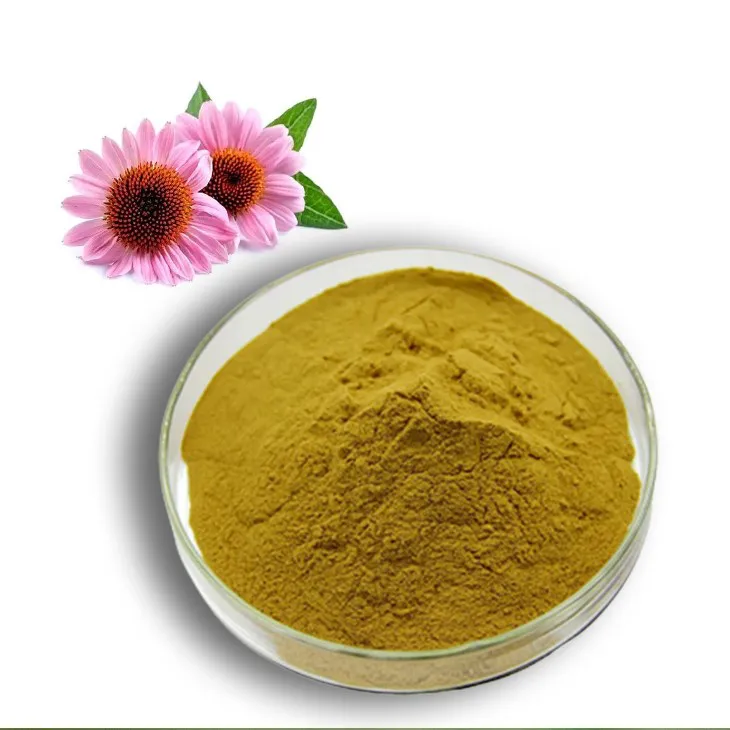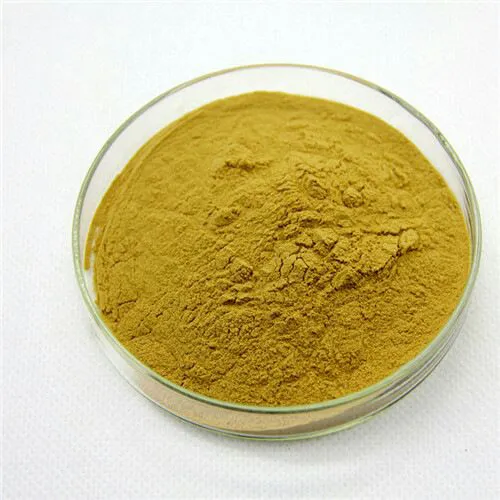- 0086-571-85302990
- sales@greenskybio.com
Does echinacea extract have benefits for diabetes? Are these all safe and suitable for diabetic patients?
2024-11-12

1. Introduction
Diabetes is a chronic metabolic disorder that affects millions of people worldwide. It is characterized by high blood glucose levels due to either insufficient insulin production or ineffective insulin utilization. In the search for complementary and alternative therapies, Echinacea Extract has emerged as a potential candidate. Echinacea is a genus of flowering plants native to North America, and its extract has been traditionally used for various medicinal purposes. However, its role in diabetes management remains a topic of scientific investigation. This article will explore the potential benefits of Echinacea Extract for diabetes, the possible mechanisms involved, and the safety considerations for diabetic patients.

2. Potential Benefits of Echinacea Extract for Diabetes
2.1 Anti - inflammatory Properties
Chronic inflammation is associated with the development and progression of diabetes. Echinacea extract has been shown to possess anti - inflammatory properties. It contains various bioactive compounds such as alkamides, caffeic acid derivatives, and polysaccharides that can modulate the immune system and reduce inflammation. By reducing inflammation, it may potentially improve insulin sensitivity and glucose metabolism. For example, in vitro studies have demonstrated that echinacea - derived compounds can inhibit the production of pro - inflammatory cytokines, which are often elevated in diabetic patients.
2.2 Antioxidant Activity
Oxidative stress is another key factor in diabetes pathophysiology. High blood glucose levels can lead to the overproduction of reactive oxygen species (ROS), which can damage cells and tissues, including pancreatic beta - cells responsible for insulin production. Echinacea extract is rich in antioxidants, such as flavonoids and phenolic acids. These antioxidants can scavenge ROS, protecting cells from oxidative damage. In animal studies, echinacea supplementation has been shown to reduce oxidative stress markers in diabetic models, suggesting a potential role in preventing or delaying diabetes - related complications.
2.3 Blood Glucose Regulation
Some preliminary evidence suggests that echinacea extract may have an impact on blood glucose regulation. It may act on multiple pathways involved in glucose homeostasis. For instance, it could potentially enhance insulin secretion from pancreatic beta - cells or improve insulin signaling in peripheral tissues. However, the exact mechanisms underlying these effects are not fully understood. In a small - scale human study, participants who took echinacea extract showed a modest reduction in fasting blood glucose levels, but more research is needed to confirm these findings and establish its long - term efficacy.

3. Possible Mechanisms of Action
3.1 Interaction with the Immune System
The immune system plays a crucial role in diabetes, especially in type 1 diabetes where autoimmunity is involved. Echinacea extract can interact with the immune system by modulating the activity of immune cells. It may regulate the balance between different immune cell subsets, such as T - cells and macrophages. In type 1 diabetes, it could potentially prevent the autoimmune destruction of pancreatic beta - cells by suppressing the overactive immune response. In type 2 diabetes, its immunomodulatory effects may help reduce inflammation - associated insulin resistance.
3.2 Influence on Cellular Signaling Pathways
Echinacea extract may also influence cellular signaling pathways related to glucose metabolism. For example, it could affect the phosphatidylinositol - 3 - kinase (PI3K)/Akt pathway, which is a key regulator of insulin signaling. By activating or modulating this pathway, echinacea extract may enhance insulin - mediated glucose uptake in muscle and adipose tissues. Additionally, it may interact with other signaling molecules involved in gluconeogenesis and glycogenolysis in the liver, thereby contributing to blood glucose control.

4. Safety Considerations for Diabetic Patients
4.1 General Safety
When considering the use of echinacea extract for diabetes, safety is of utmost importance. In general, echinacea is considered relatively safe when used appropriately. However, some individuals may experience mild side effects such as gastrointestinal upset, including nausea, vomiting, and diarrhea. These side effects are usually self - limiting and resolve on their own. Diabetic patients should be aware of these potential side effects and monitor their symptoms if they choose to take echinacea extract.
4.2 Interaction with Medications
One major concern for diabetic patients is the potential interaction between echinacea extract and diabetes medications. Echinacea may interact with drugs that are metabolized by the liver, such as some oral hypoglycemic agents. It could potentially affect the metabolism and efficacy of these medications. For example, it may increase or decrease the blood levels of certain drugs, leading to either ineffective treatment or an increased risk of adverse effects. Therefore, diabetic patients who are taking medications should consult their healthcare provider before starting echinacea extract supplementation.
4.3 Quality and Standardization
The quality and standardization of echinacea products on the market can vary widely. Different preparations may contain different concentrations of active compounds, which can affect their efficacy and safety. Diabetic patients should choose high - quality echinacea extract products from reliable sources. Look for products that are standardized to a specific content of bioactive compounds, such as alkamides or caffeic acid derivatives. This can help ensure consistent and reliable results.

5. Conclusion
In conclusion, echinacea extract shows potential benefits for diabetes through its anti - inflammatory, antioxidant, and blood glucose - regulating properties. The possible mechanisms involve interactions with the immune system and cellular signaling pathways. However, safety considerations, including potential side effects, interactions with medications, and product quality, must be carefully evaluated for diabetic patients. More research, especially large - scale, long - term clinical trials, is needed to fully understand the role of echinacea extract in diabetes management. Until then, diabetic patients should approach the use of echinacea extract with caution and under the guidance of a healthcare provider.
FAQ:
1. What is echinacea extract?
Echinacea extract is derived from the echinacea plant. There are several species of echinacea, and the extract is often used in herbal medicine. It contains various bioactive compounds such as polysaccharides, alkamides, and flavonoids.
2. How might echinacea extract benefit diabetes?
Some research suggests that echinacea extract may have anti - inflammatory properties. In diabetes, chronic inflammation is often present. By reducing inflammation, it could potentially help improve insulin sensitivity. Also, it may have antioxidant effects, which can protect cells from oxidative stress that is often increased in diabetic patients.
3. Are there any scientific studies on echinacea extract and diabetes?
Yes, there are some scientific studies. However, the results are not entirely conclusive. Some studies in animal models have shown potential benefits in terms of blood glucose regulation and improvement in some diabetic - related markers. But more research, especially in human clinical trials, is needed to firmly establish its effects on diabetes.
4. Is echinacea extract safe for all diabetic patients?
No. While echinacea extract is generally considered safe for most people when used appropriately, diabetic patients may have different responses. Some diabetic patients may be taking other medications, and echinacea extract could potentially interact with those medications. Also, some individuals may have allergic reactions to echinacea.
5. How should diabetic patients use echinacea extract if they want to try it?
Before using echinacea extract, diabetic patients should consult their healthcare providers. If approved, they should follow the recommended dosage. It's important not to exceed the recommended amount as overuse may lead to potential side effects. And they should closely monitor their blood sugar levels and any possible changes in their health while using it.
Related literature
- The Potential of Echinacea in Diabetes Management: A Review of Current Evidence"
- "Echinacea and its Bioactive Compounds: Implications for Diabetes Mellitus"
- "Safety and Efficacy of Echinacea Extract in Diabetic Patients: A Meta - Analysis"
- ▶ Hesperidin
- ▶ citrus bioflavonoids
- ▶ plant extract
- ▶ lycopene
- ▶ Diosmin
- ▶ Grape seed extract
- ▶ Sea buckthorn Juice Powder
- ▶ Beetroot powder
- ▶ Hops Extract
- ▶ Artichoke Extract
- ▶ Reishi mushroom extract
- ▶ Astaxanthin
- ▶ Green Tea Extract
- ▶ Curcumin Extract
- ▶ Horse Chestnut Extract
- ▶ Other Problems
- ▶ Boswellia Serrata Extract
- ▶ Resveratrol Extract
- ▶ Marigold Extract
- ▶ Grape Leaf Extract
- ▶ blog3
-
Cranberry Plants and Skin - care Products.
2024-11-12
-
Fenugreek Extract Powder
2024-11-12
-
Hedyotis Diffusa Extract
2024-11-12
-
Nettle leaf extract
2024-11-12
-
White mustard seed extract
2024-11-12
-
Agaricus Blazei Extract
2024-11-12
-
Phyllanthus Emblica Extract
2024-11-12
-
Kupilu Extract
2024-11-12
-
Kelp Extract Powder
2024-11-12
-
Buckthorn bark extract
2024-11-12
-
Milk Thistle Extract
2024-11-12





















